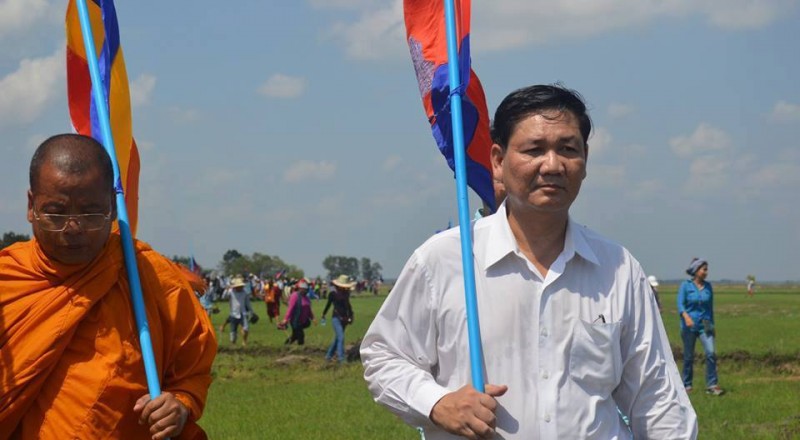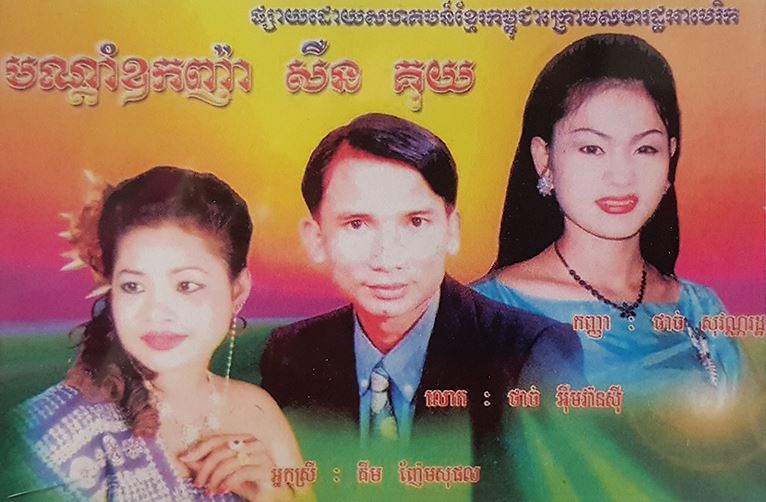CNRP Statement on ACU’s Human Rights Violations
USCIRF’s 2016 Annual Report on Vietnam’s Religious Rights Violation
ស្នងការសហរដ្ឋអាមេរិកទទួលបន្ទុកសេរីភាពជំនឿសាសនាអន្ដរជាតិ
Mon the 11th Waning Moon of Citta B.E.2559, May 2, A.D.2016 Year of the Monkey
សូមទាញយករបាយការណ៍ប្រចាំឆ្នាំ២០១៦ ស្ដីពី ការរំលោភសិទ្ធិសេរីភាពជំនឿសាសនានៅប្រទេសវៀតណាមជាភាសាអង់គ្លេស Download USCIF 2016 Annual Report in English: USCIRF 2016 Annual Report
សូមទាញយកលិខិតទៅរដ្ឋាភិបាលសហរដ្ឋអាមេរិកជាភាសាអង់គ្លេស
Download Transmission Letters in English: Transmittal Letters

USCIRF Welcomes CPC Designations: Urges Additional Designations and Actions
ស្នងការសហរដ្ឋអាមេរិកទទួលបន្ទុកសេរីភាពជំនឿសាសនាអន្ដរជាតិ
Sun the 4th Waxing Moon of Citta B.E.2559, April 24, A.D.2016 Year of the Monkey
For Immediate Release
April 20, 2016
 សូមទាញយកអនុសាសន៍ជាភាសាអង់គ្លេស Download CPC Designations in English: USCIRF 2560
សូមទាញយកអនុសាសន៍ជាភាសាអង់គ្លេស Download CPC Designations in English: USCIRF 2560
Washington, D.C. — The U.S. Commission on International Religious Freedom (USCIRF) welcomes Secretary of State John Kerry’s re-designation on April 15, 2016 of Burma, China, Eritrea, Iran, North Korea, Sudan, Saudi Arabia, Turkmenistan, and Uzbekistan, as “countries of particular concern,” or CPCs, under the International Religious Freedom Act, and the designation for the first time of Tajikistan as a CPC.
“USCIRF welcomes the designation of these ten countries. The CPC designation shines a spotlight on the “systematic, ongoing, and egregious” violations of the freedom of religion or belief that are taking place in these nations. However, the Secretary also waived imposing any consequences on Saudi Arabia, Turkmenistan, Uzbekistan, and Tajikistan. The CPC designation brings with it a unique toolbox of policy options to effectively promote religious freedom, and USCIRF encourages the Administration to use these tools,” said Robert P. George, USCIRF’s Chairman.
While commending the addition of Tajikistan, USCIRF has concluded that the CPC list should be expanded to include seven other countries: Central African Republic, Egypt, Iraq, Nigeria, Pakistan, Syria, and Vietnam. USCIRF also urges that waivers be limited to a set period of time and subject to review for renewal.
For more information about the CPC mechanism and implementation of the International Religious Freedom Act (IRFA), please see USCIRF’s 2015 Annual Report.
To interview a USCIRF Commissioner, please contact USCIRF at media@uscirf.gov or 202-786-0613.
Preah Nimith Waterfall
ទឹកធ្លាក់ព្រះនិមិត្ត
ព្រំដែនរវាងប្រទេសកម្ពុជា-លាវ ក្នុងសហគមន៍ព្រៃឈើព្រះលាន ឃុំកំពង់ស្រឡៅពីរ ស្រុកឆែប ខេត្ដព្រះវិហារ
Mon the 12th Waxing Moon of Citta B.E.2559, April 18, A.D.2016 Year of the Monkey
Preah Vihear Province, Cambodia. Credit to : Post Khmer
Beloved writer Kong Bunchhoeun dies
Mon the 12th Waxing Moon of Citta B.E.2559, April 18, A.D.2016 Year of the Monkey

Cambodian music, poetry, film and literature lovers are in mourning for the loss of Kong Bunchhoeun, who died yesterday aged 76. Photo supplied
Prolific Cambodian songwriter, poet, filmmaker and author Kong Bunchhoeun passed away yesterday in Norway at the age of 76. His death was announced by his family on Facebook.
Bunchhoeun composed over 200 songs during the 1960s and 1970s, writing for “Golden Age” greats, including Sinn Sisamouth. Most of his work centred on his hometown of Battambang, earning him the sobriquet “Master Poet of Songkae River”.
For most Cambodians, Bunchhoeun is most recognisable as a songwriter. “His loss is a great loss for Cambodia,” said Seng Dara, a music researcher and radio host. “He composed songs for so many singers: Ros Sereysothea, Pen Ron, So Saveurn, Eng Nary.”
But Bunchhoeun also wrote poems and novels, beginning when Cambodian literature flourished under the patronage of the late King Father Norodom Sihanouk. He survived the Khmer Rouge regime in part by taking a writing hiatus, according to Heng Sreang, the director of PEN Cambodia.
Even today, there is “no real record” of how many novels he may have written, Sreang said. And while he often remained out of the public eye, he at times became vocal on the page.
Bunchhoeun’s most well-known work of literature, The Destiny of Tat Marina, published in 2000, is a loosely fictionalised account of his niece Tat Marina’s affair with Svay Sitha, an undersecretary of state at the Council of Ministers, and the subsequent acid attack that left her suffering ghastly wounds. Marina identified Sitha’s wife, Khourn Sophal, as her attacker.
An arrest warrant for Sophal was signed, but she was never arrested. Bunchhoeun saw Marina’s story as an opportunity to speak out. “By highlighting the case of Tat Marina, we can hold up a mirror to the ills affecting Cambodian society,” he told the Post at the time.
It was the last book that Bunchhoeun would publish in the Kingdom. After receiving death threats, he sought asylum in Thailand and later in Norway, according to Sreang.
Bunchhoeun continued writing in self-exile, publishing at least 10 books from abroad, said Vong Socheata, a devotee of Khmer literature who counts the writer among her favourites.
“Less well known to most Cambodians are his novels written in the 1990s and early 2000s, but people who love novels love his work,” she said. “He touches on everything: philosophy, psychology, history.”
In the wake of Bunchhoeun’s death, many fans took to social media to express their grief. Among them, on Twitter, was film director Rithy Panh. Bunchhoeun counted filmmaking among his many modes of expression, Panh said, and some of his early novels were made into films after the fall of the Khmer Rouge regime.
“We have lost one of our greatest authors, a remarkable poet and songwriter – and maybe the last contemporary one,” Panh wrote in an email.
Heng Sreang, of PEN Cambodia, noted the irony that he died outside of his home country.
“The sad thing is that Cambodia did not and has not taken care of its great writers. We have few surviving talented people – with little care from the government,” he said.
So Phina, head of PEN Cambodia’s women writers committee, said she hoped Cambodian writers might draw inspiration from his work.
She highlighted a particular poem, Chivit Ney Chivit (Life of My Life): “In my whole life, I don’t want anything more than freedom to write,” it reads.
He is survived by his wife, Uch Kolab, and three children.
Additional reporting by Kong Meta.
Khmer Krom preparing to publish historical documents to distribute in annual Kampuchea Krom commemoration
ខ្មែរក្រោមរៀបចំបោះពុម្ពឯកសារប្រវត្តិសាស្ត្រសម្រាប់ចែករំលែកក្នុងថ្ងៃខួបបាត់បង់ទឹកដី
ស្ដាប់ ឬទាញយកសំឡេង
http://www.rfa.org/…/kk-print-historical-doc-…/h041616yc.mp3
Sun the 11th Waxing Moon of Citta B.E.2559, April 17, A.D.2016 Year of the Monkey
ប្រភពព័ត៌មាន Courtesy RFA/Leng Maly
 សហគមន៍ខ្មែរកម្ពុជាក្រោម កំពុងរៀបចំបោះពុម្ពឯកសារប្រវត្តិសាស្ត្រដែនដីកម្ពុជាក្រោម ដើម្បីចែកចាយទៅឲ្យពលរដ្ឋខ្មែរឲ្យទាន់ថ្ងៃខ្មែរក្រោមប្រារព្ធខួបបាត់បង់ទឹកដីកម្ពុជាក្រោម នៅថ្ងៃទី៤ ខែមិថុនា។ ឯកសារប្រវត្តិសាស្ត្រទាំងនេះ ត្រូវបានសហគមន៍ខ្មែរកម្ពុជាក្រោម ទៅស្រាវជ្រាវយកមកពីប្រទេសបារាំង ទុកឲ្យកូនខ្មែរជំនាន់ក្រោយសិក្សា ក្រោយពីវៀតណាម អះអាងថា ដែនដីកម្ពុជាក្រោម គឺជាទឹកដីរបស់គេតាំងពីយូរយារណាស់មកហើយ។ (more…)
សហគមន៍ខ្មែរកម្ពុជាក្រោម កំពុងរៀបចំបោះពុម្ពឯកសារប្រវត្តិសាស្ត្រដែនដីកម្ពុជាក្រោម ដើម្បីចែកចាយទៅឲ្យពលរដ្ឋខ្មែរឲ្យទាន់ថ្ងៃខ្មែរក្រោមប្រារព្ធខួបបាត់បង់ទឹកដីកម្ពុជាក្រោម នៅថ្ងៃទី៤ ខែមិថុនា។ ឯកសារប្រវត្តិសាស្ត្រទាំងនេះ ត្រូវបានសហគមន៍ខ្មែរកម្ពុជាក្រោម ទៅស្រាវជ្រាវយកមកពីប្រទេសបារាំង ទុកឲ្យកូនខ្មែរជំនាន់ក្រោយសិក្សា ក្រោយពីវៀតណាម អះអាងថា ដែនដីកម្ពុជាក្រោម គឺជាទឹកដីរបស់គេតាំងពីយូរយារណាស់មកហើយ។ (more…)
Kong Bunchhoeun passed away
លោកព្រឹទ្ធាចារ្យកវីដងស្ទឹងសង្កែ លោក គង្គ ប៊ុនឈឿន ទទួលមរណភាពក្នុងជន្មាយុ ៧៧ឆ្នាំ នៅក្នុងប្រទេសណ័រវេ ទ្វីបអឺរ៉ុប
The late and renowned Cambodian poet of Battambang province Mr. Kong Bunchhoeun passed away at age 77 in Norway, Europe
Sun the 11th Waxing Moon of Citta B.E.2559, April 17, A.D.2016 Year of the Monkey
Vietnam Human Rights Report for 2015
របាយការណ៍ប្រចាំឆ្នាំ២០១៥ ស្ដីពី ការរំលោភសិទ្ធិមនុស្សនៅវៀតណាមៈ ក្រសួងការបរទេសសហរដ្ឋអាមេរិក
Country Reports on Human Rights Practices for 2015
Thu the 8th Waxing Moon of Citta B.E.2559, April 14, A.D.2016 Year of the Goat
Courtesy the U.S. Department of State
 EXECUTIVE SUMMARY
EXECUTIVE SUMMARY
The Socialist Republic of Vietnam is an authoritarian state ruled by a single party, the Communist Party of Vietnam (CPV), and led by General Secretary Nguyen Phu Trong, Prime Minister Nguyen Tan Dung, and President Truong Tan Sang. The most recent National Assembly elections, held in 2011, were neither free nor fair, despite limited competition among CPV-vetted candidates. Civilian authorities maintained effective control over the security forces.
The government began implementing laws in accordance with constitutional amendments, including human rights-related articles, promulgated in January 2014. In November the National Assembly passed several laws affecting the rights of its citizens, including a new penal code, criminal procedure code, law on custody and temporary detention, civil code, and civil procedure code. The criminal procedure code and the custody law codified the presumption of innocence, placed the burden of proof in criminal proceedings on the state, recognized a limited right to remain silent in certain circumstances, and loosened regulations on the right to counsel. The penal code retained vague national security provisions and in some areas added new offenses criminalizing preparatory acts.
The most significant human rights problems in the country were severe government restrictions of citizens’ political rights, particularly their right to change their government through free and fair elections; limits on citizens’ civil liberties, including freedom of assembly, association, and expression; and inadequate protection of citizens’ due process rights, including protection against arbitrary detention.
Other human rights abuses included arbitrary and unlawful deprivation of life; police attacks and corporal punishment; arbitrary arrest and detention for political activities; continued police mistreatment of suspects during arrest and detention, including the use of lethal force and austere prison conditions; and denial of the right to a fair and expeditious trial. The judicial system was opaque and lacked independence, and political and economic influences regularly affected judicial outcomes. The government limited freedom of speech and suppressed dissent; exercised control over and censorship of the press; restricted internet freedom and freedom of religion; maintained often-heavy surveillance of activists; and continued to limit privacy rights and freedoms of assembly, association, and movement. The government continued to control registration of nongovernmental organizations (NGOs) closely, including human rights organizations. Authorities restricted visits by human rights NGOs that did not agree to government oversight. Authorities and NGOs recorded higher numbers of human trafficking victims, possibly attributable to growing demand among neighboring countries as well as the country’s decision in 2012 to improve its efforts to track and investigate cases. The government maintained limits on workers’ rights to form and join independent unions and did not enforce safe and healthy working conditions adequately. Child labor persisted, especially in agricultural occupations.
The government sometimes took corrective action, including prosecutions, against officials who violated the law, and police officers sometimes acted with impunity. Police corruption persisted.
Read Full Report in PDF: Vietnam_Human_Rights_Reports_2015_USSDept
Cambodia Human Rights Report for 2015
របាយការណ៍ប្រចាំឆ្នាំ២០១៥ ស្ដីពី ការរំលោភសិទ្ធិមនុស្សនៅកម្ពុជាៈ ក្រសួងការបរទេសសហរដ្ឋអាមេរិក
Country Reports on Human Rights Practices for 2015
Thu the 8th Waxing Moon of Citta B.E.2559, April 14, A.D.2016 Year of the Goat
Courtesy the U.S. Department of State
 EXECUTIVE SUMMARY
EXECUTIVE SUMMARY
Cambodia is a constitutional monarchy with an elected parliamentary form of government. In the most recent national elections in 2013, the Cambodian People’s Party (CPP) won a majority of the 123 National Assembly seats. International and local nongovernmental organization (NGO) observers assessed the election process suffered numerous flaws, including problems with the voter registry, unequal access to the media, and the issuance of an unusually large number of temporary official identification cards to voters. Civilian authorities maintained effective control over the security forces; however, there were frequent abuses by security forces.
The most significant human rights problems included a politicized and ineffective judiciary; growing restrictions on freedoms of speech, assembly, and association; and the use of violence and threatened imprisonment to intimidate the opposition.
Other human rights problems included continued prisoner abuse, restrictions on press freedom, failure to grant equal access and fair treatment to asylum seekers, pervasive corruption, and trafficking in persons.
The government prosecuted some officials who committed abuses, but impunity for corruption and most abuses persisted.
Read Full Report in PDF: Cambodia_Human_Rights_Reports_2015_USSDept
សូមគាំទ្រឧបត្ថម្ភ សហគមន៍ខ្មែរក្រោម Support KKC
សូមអរគុណដ៏ជ្រាលជ្រៅចំពោះសប្បុរសជននូវវិភាគទានទាំងនេះ។
We’re On Facebook

Sign in
Click here to reload the page over ssl.









